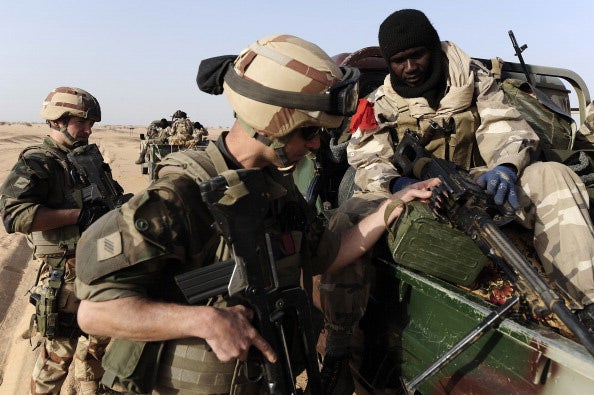|
February 27, 2013
Stanford scholars view the Mali conflict with a historical eye
As the French intervention in Mali continues, Stanford experts who study the history and culture of West Africa examine the significance of Mali's racial and religious histories. By Kelsey Geiser

A French soldier, center, looks at the weapon of a Malian soldier as they enter Bourem, northern Mali on Feb. 17, 2013. The relationship between France and Mali, its former colony, is complicated, says Stanford scholar Sean Hanretta. (Photo: Pascal Guyot/AFP/Getty Images)
Over the past year, the African nation of Mali, formerly a French colony, has faced a crisis of disorganization, uncertainty and violence. In response to an influx of Islamist extremists in the country, the Malian government called on France for help. The conflict has brought attention to the African nation, but its history and culture are largely unknown to most outsiders.
Here, Stanford humanities scholars offer their perspectives on the crisis.
Sean Hanretta
Sean Hanretta is an associate professor of African history whose research centers on the intellectual and cultural history of Islam in West Africa. A former Mellon Fellow and Fulbright Scholar, Hanretta's current projects focus on Islamic political identity in Accra, on wedding and funeral reform in the Gold Coast/Ghana region and the history of higher education in West Africa.
What do you think would come as a surprise to the public about Islam's history in this region?
That it's very old, for one thing – we have solid evidence of Islamic practice for at least 1,000 years. That the intellectual, cultural and social leaders of Islam in West Africa were Africans, not Arabs (to make a somewhat arbitrary and problematic distinction); there was no Arab "conquest" of West Africa that imposed Islam on people as a colonial culture. That Muslim West Africa generated a complex, sophisticated written culture, with epics, historical chronicles, legal treatises, theological works and philosophical and scientific works. That there was a time when that culture was clearly intellectually ahead of Europe and was an intellectual rival and partner of North Africa. That some of the people who were brought from West Africa to the Americas (including to what became the United States) were Muslims and that in some cases they seem to have taken a role in organizing and leading uprisings against slavery, in Brazil for instance. And lastly that Europeans (educated Europeans at least) used to know something about Muslim West Africa. It was important to know about the area for trade as far back as the 1300s and caught the attention of scholars for centuries.
How is the history of colonization impacting the relationship between France and Mali today?
The question about long-term French-Malian relations is complicated. One could, I suppose, argue that the "foreign element" in the rebel movements suggests a diminution of sovereignty, but certainly no more so than the extensive role the United States, China and France have played in the region in recent decades. I think Africans are generally fairly politically pragmatic – they've had to learn to be over the years – and so I think they're being quite strategic by inviting the lesser of two evils to help them out. They might even be thinking in positive terms about the U.S.-French intervention in Cote d'Ivoire in 2011, which was widely presented (not entirely accurately) as defending the rights of West Africa Muslims. At the same time – as most of them know far better than I do – these are the kinds of house guests that can be hard to get rid of.
Bruce Hall
Bruce Hall, an assistant professor in the Department of History at Duke University, is currently a fellow at the Stanford Humanities Center. His academic interests include Saharan and West African intellectual history and ideas about racial difference and slavery. His first book is A History of Race in Muslim West Africa, 1600-1960, which focused on the Malian town of Timbuktu and the development of ideas about racial difference in this area.
It has been reported that residents of Timbuktu as well as other Malians have accepted the French presence with open arms. How is the history of colonization impacting the relationship between the two nations today?
The collapse of the Malian army and state in the northern part of the country following the coup in March 2012 led many Malians to conclude that they needed help from outsiders to recapture lost territory. There was a lot of popular support for a French military intervention because many believed it would be more effective than an intervention by other West African countries. When it came, and especially after French helicopter pilot Damien Boiteux was killed in the first battle against Islamists in Konna, France's intervention was widely understood in Mali as the repayment of a blood debt owed to Mali by France because of the tens of thousands of Malians who were conscripted into the French army and who died fighting for France in Europe during the first and second world wars.
What racial issues might complicate the French mission?
It would be difficult to overstate the extent to which race is central to the perceptions of many people in Mali of the conflict. There is a long history of this, but in the present it rests on competing racialized grievances. So for "black" southern Malians, the nomadic Tuareg (and Malian Arabs) are racists against blacks, more or less by nature. This is bound up with ideas about the Tuareg and Arabs as having raided black settled populations in pre-colonial times for slaves. It is also connected to the repeated rebellions against the Malian state since independence by Tuareg groups in particular, which has been construed as a refusal to share a state with blacks, an inability to live in peace with one's neighbors and a general proclivity to violence and disorder natural to desert nomads.
Kelsey Geiser is an intern with the Human Experience, the Humanities web portal for Stanford University.
-30-
|